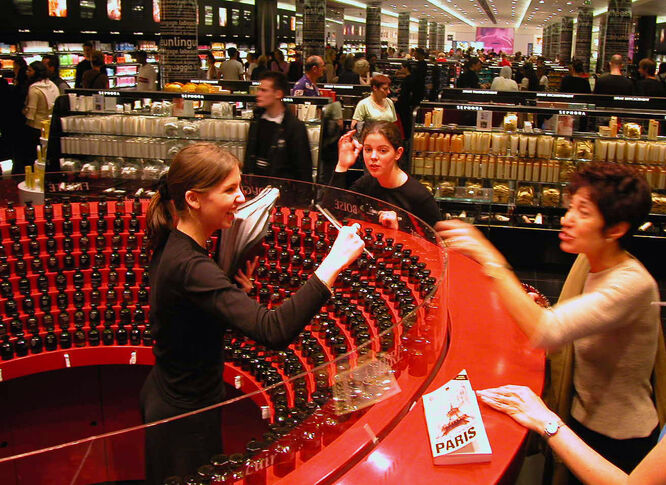Shopping Parisian-Style
By Rick Steves, Steve Smith, and Gene Openshaw
Even staunch anti-shoppers may be tempted to partake in chic Paris. Wandering among the elegant and outrageous boutiques provides a break from the heavy halls of the Louvre, and, if you approach it right, a little cultural enlightenment. Here are some tips for avoiding faux pas and making the most of the experience.
French Etiquette: Before you enter a Parisian store, remember the following points:
- In small stores, always greet the clerk by saying "Bonjour" plus their title (Madame, Mademoiselle, or Monsieur) and say "Au revoir, Madame/Mademoiselle/Monsieur" when leaving.
- The customer is not always right. In fact, figure the clerk is doing you a favor by waiting on you.
- Except for in department stores, it's not normal for the customer to handle clothing. Ask first.
- Forget returns (and don't count on exchanges).
- Saturday afternoons are busiest.
- Observe French shoppers. Then imitate.
- Don't feel obliged to buy.
Department Stores: Like cafés, department stores were invented here (surprisingly, not in America). Parisian department stores, monuments to a more relaxed, elegant era, begin with their spectacular perfume sections. Helpful information desks are usually nearby (pick up the handy store floor-plan in English). Most stores have a good selection of souvenirs and toys at fair prices and reasonable restaurants; some have great view terraces. Choose from these three great Parisian department stores: Galeries Lafayette, Printemps, and Bon Marché.
Boutiques: I enjoy window shopping, pausing at cafés, and observing the rhythm of neighborhood life. While the shops are more intimate, sales clerks are more formal — mind your manners. The ritzy streets connecting Place Madeleine and Place Vendome are a miracle mile of gourmet food shops, jewelry stores, four-star hotels, perfumeries, and exclusive clothing boutiques. Fauchon's, a bastion of over-the-top food products, hawks €7,000 bottles of Cognac (who buys this stuff?). Not to be outdone, La Maison des Truffles down the street sells black mushrooms for about €1,000 a pound, and white truffles from Italy for €2,500 a pound. Hediard's, across the square from Fauchon's, is an older, more appealing, and accessible gourmet food shop.
Flea Markets: Paris hosts several sprawling weekend flea markets (marche aux puces; literally translated, since puce is French for flea). These oversized garage sales date back to the Middle Ages, when middle-men sold old, flea-infested clothes and discarded possessions of the wealthy at bargain prices to eager peasants. Today some travelers find them claustrophobic, crowded, monster versions of those back home, though others find their French diamonds-in-the-rough and return happy. The Puces St. Ouen is the biggest and oldest of them all, with over 2,000 vendors selling everything from flamingos to faucets.
Street Markets: Several traffic-free street markets (such as the one on Rue Cler) overflow nearly daily with flowers, produce, fish vendors, and butchers, illustrating how most Parisians shopped before there were supermarkets and department stores. Browse these markets for picnics, or find a corner café and soak up the scene.
Souvenir Shops: Avoid souvenir carts in front of famous monuments. Prices and selection are better in shops and department stores. The riverfront bouquiniste stalls near Notre-Dame sell a variety of used books, old posters and postcards, magazines, and tourist paraphernalia in the most romantic setting.
Whether you indulge in a new wardrobe, an artsy poster, or just one luscious pastry, a shopping excursion provides a priceless slice of Parisian life.
Steve Smith and Gene Openshaw are the co-authors of the Rick Steves Paris guidebook.

